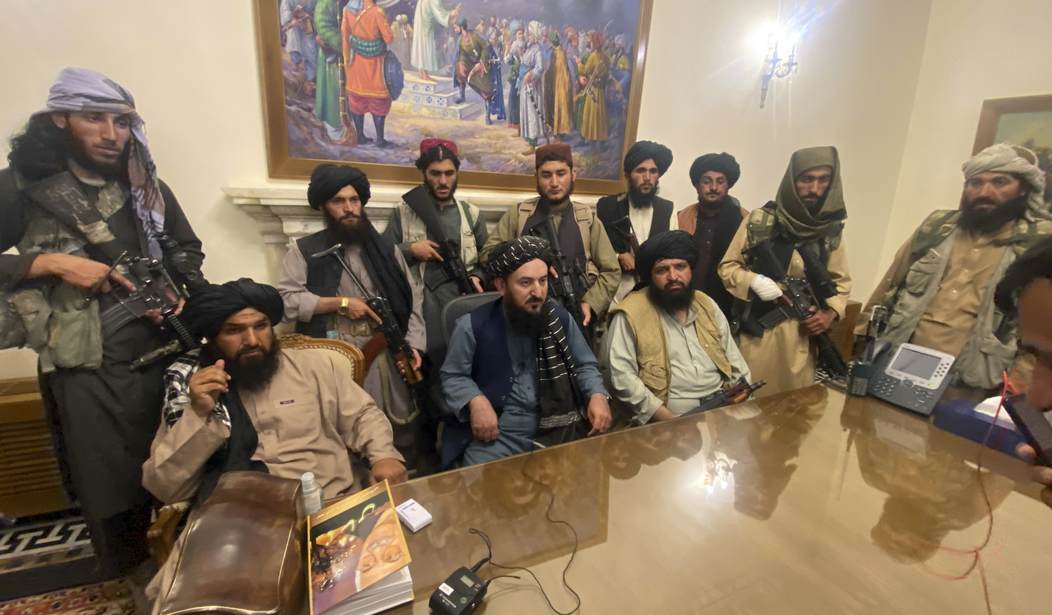Last month the Taliban in Afghanistan insisted that humanitarian organizations fire all of their female staffers. The move was another escalation in denying women basic rights of work and education, despite the assurances that the Taliban gave to the Western world that they would modernize their rule in Afghanistan. They haven’t, of course, and life for women and girls is only getting worse. It’s back to the bad old days.
Afghanistan is back to the days before 9/11/01. Women are not allowed to go to school, work outside the home, or travel without a male family member, and they must wear hijabs. Everything we feared for Afghanistan women has become reality.
The U.N. Security Council agreed to urge the Taliban rulers in Afghanistan to reverse all “oppressive” restrictions on girls and women including the latest ban on women working in NGOs. A joint statement was issued from 11 of the 15 council members. It said that female aid workers are crucial to addressing Afghanistan’s “dire humanitarian situation” because they provide “critical life-saving support to women and girls” that men can’t reach. Regardless of gender, the council demands full access for humanitarian workers.
Japanese Ambassador Kimihiro Ishikane, the current council president, delivered the statement to reporters before a closed council meeting, surrounded by diplomats from the 10 other countries — Albania, Brazil, Ecuador, France, Gabon, Malta, Switzerland, Britain, United States and United Arab Emirates. The four council nations that didn’t support the statement were Russia, China, Ghana and Mozambique.
United Arab Emirates Ambassador Lana Nusseibeh, who called for the meeting with Japan, told reporters afterward that “the key takeaways” from the closed discussion were the unity from humanitarian actors that the work they are doing is essential — and the unity in the Security Council to remain engaged, not only to express solidarity but practically “to try and help move the situation on the ground towards a better trajectory.”
Nusseibeh said another takeaway is that engagement with the Taliban has to continue, that there are different ministries mandated to regulate different sectors of humanitarian work.
Diplomats said that some countries are pushing for a Security Council resolution demanding the Taliban reverse all its edicts on women and girls, but it was too early to say if that would happen. Nusseibeh said council members are discussing next steps.
I can understand how they may want to go slow to urge change with the Taliban’s course of direction in order to keep communication open but that sure doesn’t help the women and girls they are trying to help. Each day the Taliban extremists are in control of Afghan lives, everyday life gets worse. It is very clear that the Taliban have gone back on their word to support human rights in Afghanistan, especially for women, and the results of the disastrous withdrawal from the country are proving to be as we thought they would be. Only a fool would trust the Taliban’s word on human rights, yet that is exactly what the Biden administration paid lip service to. Biden and his State Department insisted that the bad old Taliban would not immediately take control of the country when the U.S. and other Western forces left, yet that is exactly what happened.
The 11 council members also urged the immediate reversal of the Taliban’s ban on girls attending secondary school and girls and women attending university as well as restrictions on women’s human rights and freedoms.
Britain’s U.N. ambassador, Barbara Woodward, tweeted that as a result of the ban on women working for humanitarian groups, as of Thursday, “15% of NGOs had paused all work in Afghanistan, 68% had significantly reduced operations.” She added: “Humanitarian aid can’t happen without women.”
David Miliband, CEO of the International Rescue Committee, a group that has worked in Afghanistan since 1988, said that last year its 8,000 staff, including 3,000 women, served 5.3 million Afghans across the country including 2.7 million women and girls.
But the group has been forced to pause most operations because of the decree banning female NGO staff from working, Miliband said in a prepared briefing to the council obtained by The Associated Press.
Miliband offers a twin-track plan for women.
He outlined a twin-track approach for getting women back to work, saying: “We have a chance of preventing further calamity for the Afghan people, but only if the international community is decisive, practical and disciplined.”
On one track, he said, it must be made clear to the Taliban that there can be no business as usual without women workers. On another track, Miliband said, when Taliban decision-makers in ministries or localities support reopening services “we will quickly move to restart services and build momentum for a return to our operating model.”
The International Rescue Committee said in a statement Friday that earlier this week, “the Ministry of Public Health offered assurances that female health staff, and those working in office support roles, can resume working.” Based on this clarity, IRC said it has restarted health and nutrition services in four provinces.
Maybe there is a glimmer of hope for Afghan women. That will only happen, though, if the international community can stick together to demand that the Taliban modernize enough to allow women basic human rights.
UNICEF has also weighed in on the side of freedom for women to work with NGOs.
In another prepared briefing, also obtained by AP, Catherine Russell, executive director of the U.N. children’s agency UNICEF, said the decree banning women from working for NGOs “is both wrong and dangerous” and “stands to deepen the country’s devastating humanitarian crisis.”
She said UNICEF projects that this year 13.5 million Afghan children will need humanitarian assistance and 20 million Afghans will be at crisis or emergency levels of needing food by March, including “upwards of 875,000 severely wasted children under 5.”
We shouldn’t hold our breath that the barbarians in control of Afghanistan will have a sudden change of heart. Their history shows otherwise.








Join the conversation as a VIP Member